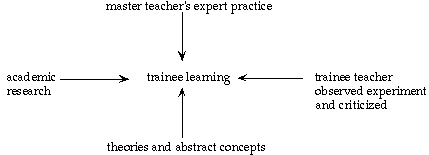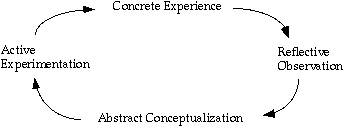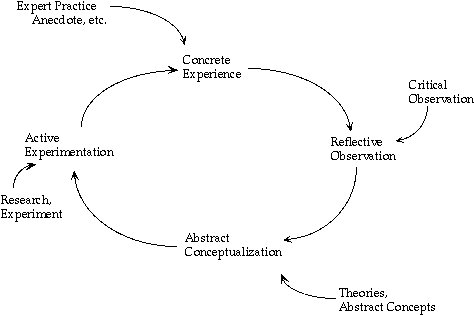The Language Teacher | |||||||||||||||||||||||||
|
Return to The Language Teacher Online
DefinitionsTeacher training may be defined as preparation for professional practice usually through formal courses at colleges or universities. It usually results in some kind of recognized accreditation, granting successful candidates a certificate and the right to put letters after their names such as BATEFL, PGCE, RSA Dip.TEFLA, etc. Teacher development , on the other hand, usually refers to professional learning by teachers already engaged in professional practice, usually through reflective discussion sessions based on current classroom experience. So the first, basic difference is that teacher training implies preservice learning, and teacher development in-service. But it is not so simple. A further very basic and far-reaching distinction implied in the above definitions has to do with their different underlying theories of the nature of professional learning.
Models of teacher learningOne "way in" to this distinction which I have found helpful is to define it in terms of Wallace's (1991) three models of teacher learning: the applied science, craft, and reflective models. According to the applied science model, teachers learn to be teachers by being taught research-based theories, and then applying them in practice: The implication is that the most important professional knowledge is generalizable theory. The craft model means learning teaching in the way apprentices learn crafts like shoemaking or carpentry: The novice watches and imitates a master teacher, and obeys the latter's directions for improvement. Here the implication is that teaching is mainly a practical skill. Finally we have the reflection model, according to which teachers learn by reflecting on their own experience and applying what they have learned in order to develop their professional abilities further.
Figure 1: Teacher training
Note that the trainee is on the end of all the arrows: He or she is essentially receptive, being taught by the master teacher's model or criticism (craft model) or by the trainer's input on research and theory (applied science). There is very little place for his or her own initiative in creating new output, thoughts, or practical ideas. Wallace's third model (learning derived from reflection on practice), corresponds with "teacher development." It can be represented through the model of experiential learning provided by Kolb (1984) ( See Figure 2).
Figure 2: "Teacher development" (after Kolb, 1984)
In contrast to the previous diagram, the teacher-learner is active: experiencing, reflecting, conceptualizing, experimenting. External sources of input, on the other hand, do not appear as a significant contributor to learning. Teacher development sessionsIf we turn to the literature on "teacher development" -- especially that which appears in the newsletter of the Teacher Development special interest group of IATEFL -- we find a different aspect being stressed: the practical side of the organization of "teacher development" sessions. These are envisaged as meetings of groups of colleagues, often working in the same institution, where participants share and discuss aspects of their ongoing classroom experience. The differences which are thrown up are therefore more practical in nature -- but the connection with the previous theoretical model is clear. The contrasting lists below are based on articles by Bolitho (1986), Edge (1986), Freeman (1990), McGrath (1986), Tangalos (1991), and Underhill (1987).
The first six items here clearly correspond with the "reflective" versus "applied science/craft" diagrams previously shown. Items seven to ten add a fresh dimension: that of the "person-centred" approach. Many writers emphasize that the function of "teacher development" is to develop the teacher's own potential as a "whole person" through collaborative interaction with colleagues. There is a clear association here with the humanist methodologies in language teaching and with the ideas behind "collaborative development" (Edge, 1991), where colleagues help each other develop through non-judgmental listening and response. Item eleven -- teacher empowerment -- is a key one, which I will develop further below. The teacher as professionalTeacher empowerment means that the teacher is seen as an autonomous professional, responsible for, and an authority on, professional learning and practice, rather than subordinate to external authority and expertise. The concept "professional" may be clarified by contrasting it with opposing ones such as "lay." "amateur." "technician." and "academic" (Ur, 1997). 1.Professional vs. lay. The teacher is a member of a specific professional community, as distinct from the general public who are designated in contrast "lay." This professional group is distinguished by its particular skills, knowledge, language, conventions and ethical principles. Such a community maintains and develops its solidarity and standing through conferences, journals, Internet communication, etc. 2. Professional vs. amateur. The professional teacher is differentiated from the amateur by virtue of superior performance as a practitioner, superior knowledge, consistent self-development and a serious commitment to the achievement of teaching objectives -- the advancement, or bringing about, of learning on the part of their students. All of this usually implies better pay and conditions. 3. Professional vs. technician. The professional possesses an underlying understanding of the principles of their practice, not just a collection of technical skills. This enables them to make appropriate real-time decisions in practice when different principles appear to conflict. More importantly, it equips them with the ability and authority to criticize input from other professionals or academics and evaluate its appropriateness or acceptability in principle or for specific contexts. 4. Professional vs. academic. The professional is primarily engaged in real-time action and is motivated by the desire to bring about real-world change seen as valuable or desirable. The academic, on the other hand, is primarily engaged in thinking and experimenting, mainly motivated by the desire to discover truth or further knowledge. This is obviously something of an over-simplification -- the professional is also interested in abstract knowledge as is the academic in real-world change -- but the primary "thrust" of their motives and activity is, I think, as defined here. An important implication of this is that research and thinking by the academic may not always apply or be relevant to professional practice, just as "what works" for us may not be for them a worthwhile or generalizable scientific hypothesis. Thus, to claim that academic research should justify itself in terms of its usefulness or applicability to real-world professional practice is to deny academic freedom and the joy of discovery for its own sake. And from the professional's point of view: We should learn selectively and critically from the academic's research and thinking, and not accept these as the main authoritative bases for professional knowledge. The empowerment of the teacher, in the sense of endowing him or her with the status of autonomous professional as defined here, sounds great; but it does not always happen. While preparing this paper I came across several instances of situations where "teacher development" was understood as a training methodology based on "involving" teachers in interactive discussion, but where the ultimate objective was to get them to accept innovations that had been determined elsewhere: by the Ministry of Education, or by some authoritative group of experts who were not themselves teachers. And the success of such "teacher development" was evaluated by the extent to which the managers of the project succeeded in convincing teachers to take on board these innovations (for example, Hayes, 1995; Bax, 1995a). In such cases, teachers appear to be given some measure of freedom to express their opinions and initiate discussion -- but the aim of the organizers of the project is to use this discussion in order to persuade the teachers to adopt certain pre-determined ideas for change, rather than to explore and develop their own. I do not mean to imply that such projects are "bad." On the contrary, they tell the story of some interesting work on the introduction of difficult but clearly valuable change in teacher attitudes or methodology; and, the work invested in initiating, carrying through, and documenting such work has produced results from which we can all learn. I would claim, however, that they are not talking about real "teacher development" as I understand the term; they are talking about effective methods of bringing about change in education. This is because true teacher development, on its own, is not a very effective means for bringing about change. You need a combination of aspects of "development" and "training." Teacher training versus teacher development: a conclusionMy answer to the question posed in the title of this article would be "yes" - - but with reservations. The distinction between teacher training and teacher development is an interesting one, and, like Krashen's learning versus acquisition of language it has given rise to some useful and productive thinking about the nature of professional learning. But, also like Krashen's dichotomy, the distinction ceases to be a useful one if the two concepts are considered to be completely separable or mutually exclusive. They are of optimal value when they come together. Neither model of teacher learning is satisfactory on its own. Teacher training as described in Figure 1 leaves no scope for the teacher's own reflection and initiative. This is contrary to our intuitions about effective learning, and contrary to the experience of most competent teachers who will tell you if you ask them that the single most important contribution to their present expertise was reflection on their own experience. It is also contrary to the fairly widely accepted social constructivist, or Vygotzkian, conception of the nature of learning, according to which we learn by constructing our own understanding of reality through interaction with others (parents, teachers, peers). The model of teacher development as presented in Figure 2 does the opposite. It respects the teacher's own experience as a major source of learning, and allows full rein to their own thinking and initiative. But it does not appear to take into account the enormous amount of knowledge, practical and theoretical, that has been amassed by other practitioners, thinkers and researchers, and of which the teacher-learner can take advantage. Taken to an extreme, it implies that the incoming teacher has to "reinvent the wheel" on their own. Surely a proper model of professional learning would need to take into account both sources, both external and internal. Suppose we take Figure 1 and Figure 2 and combine them. We might get something like Figure 3.
Figure 3: Optimal teacher learning
I would claim that any teacher, at any stage of their career, learns most effectively like this. The most important, central source (the inner circle) is the teacher's reflection on their own experience, whether as learner, as trainee on teaching practice or as professional teacher. But to learn only from oneself is limited: One needs also to take advantage of the enormous amount of professional knowledge and expertise "out there." waiting to be tapped. Your own experience can be enriched by hearing, seeing, or reading about the experiences of others; your reflections on your own or others' performance can be enriched by other people's critical observations; you can discover some beautiful theories through reading the literature or listening to lecturers that help you understand what you are doing; you can supplement your own experimentation by finding out about the experiments of researchers. Such knowledge, however, cannot be taken on board simply through reading or hearing about it. In order to function as real knowledge and not just as inert items of information, you need to process it through your own experience, reflection, conceptualization, and experimentation and to construct your own understanding of it. This means, of course, that not all external input will necessarily be accepted, and that that which is accepted may be extensively adapted. The teacher's processing will "filter out" those aspects which do not seem to be appropriate or comprehensible, and finally absorb the knowledge in the form which fits in with their own thought and action and which they can "own." In other words, I do not think that there is much value in basing any kind of practical professional learning on either of the models on their own -- training or development. Both pre-service and in-service courses should involve the combined process as sketched out in Fig.3 above. Frankly, this is probably what most teacher educators are doing anyway. This article does not aspire to propose substantial changes in teacher education methodology. My aim in writing it has been, rather, to clarify and order my own thinking on concepts which I have found in the past to be rather fuzzily defined or confused. I hope that the reader has also found it helpful.
References and Further ReadingBax, S. (1995a). Appropriate methodology: the content of teacher development activity. System, 23 (3), 347-357. Bax, S. (1995b). Principles for evaluating teacher development activities. English Language Teaching Journal 49 (3), 262-271. Bolitho, R. (1986). Teacher development: A personal perspective. Teacher Development, Newsletter of the IATEFL Teacher Development Special Group 1, 2. Edge, J. (1991). Cooperative development: Professional self-development through cooperation with colleagues. London: Longman. Finocchiaro, M. (1988). Teacher development -- A developmental process. English Teaching Forum, 26(3), 2-3. Freeman, D. (1989). Teacher training, development and decision making: A model of teaching and related strategies for language teaching education. TESOL Quarterly, 23(1), 27-46. Hayes, D. (1995). In-service teacher development: Some basic principles. English Language Teaching Journal 49(3), 252-61. Higgs, D. (1986). Blurring boundaries between training and development. Teacher Development: Newsletter of the IATEFL Teacher Development Special Group 3, 1. Kolb, D.A. (1984). Experiential learning: Experience as the source of learning and development. Englewood Cliffs, New Jersey: Prentice Hall. Lange, D.L. (1990). A blueprint for a teacher development program. In J.C. Richards & D. Nunan (Eds.), Second language teacher education, Cambridge: Cambridge University Press. McGrath, I. (1986). The balancing act: Our major responsibility. Teacher Development: Newsletter of the IATEFL Teacher Development Special Group 4:, 1. Tabachnik, & Zeichner (Eds.). (1991). Issues and practice in inquiry-oriented teacher education. Lewes: The Falmer Press. Tangalos, B. (1991). When you get lemons, make lemonade. English Teaching Forum, 29(4), 35-36. Underhill, A. (1987). Empowering ourselves to act -- the common denominator of td? Teacher Development: Newsletter of the IATEFL Teacher Development Special Group 7, 1. Ur, P. (1997). The English teacher as professional. English Teaching Professional 1(2), 3-5. Wallace, M.J. (1991). Training foreign language teachers: A reflective approach. Cambridge: Cambridge University Press. Penny Ur teaches at Oranim, University or Haifa, Israel. Her publications include Five Minute Activites, Grammar Practice Activities, and A Course in Language Teaching. All
articles at this site are copyright © 1997 by their respective authors. | |||||||||||||||||||||||||



